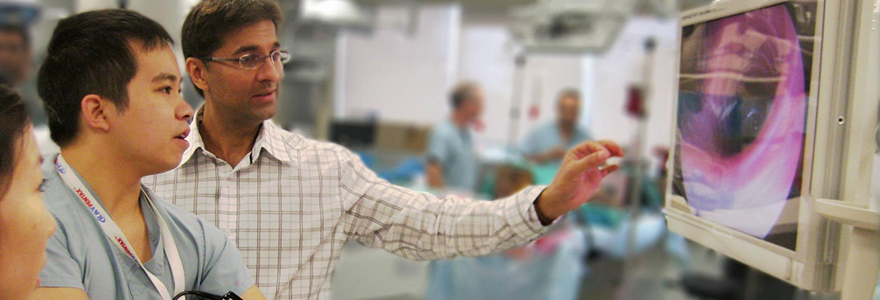Residency Program

The residency-training program in Otolaryngology - Head and Neck Surgery was established at Western University in 1962. Over the years, the program has gained a reputation for excellence in didactic and bedside teaching of residents in a broad spectrum of otolaryngology. Our residents routinely leave the program as highly competent surgeons and consultants in Otolaryngology-Head and Neck Surgery and have distinguished themselves in academic and community practice in Canada and the United States.
The residency program is a five-year program. In the first 13 blocks there are 4 blocks on service with the remainder off-service. Following this, the subsequent 4 years of training comprise work in Otolaryngology and are spent on-service, except for 3 months of elective time spread over the PGY 2 to 4 years. To date, we have accepted up to three Ontario Ministry of Health funded residents each year. Clinical training takes place at all London teaching hospitals including Victoria and University Campuses of the London Health Sciences Centre and St. Joseph's Health Centre.
Current faculty consists of 15 full-time Otolaryngologists. The sub-specialty interests of the faculty include otology, neuro-otology, pediatric otolaryngology, head and neck oncology, facial plastic and reconstructive surgery, facial cosmetic surgery, and rhinology. Cross-appointees to the Department have expertise in head and neck radiation oncology, oral surgery and maxillofacial trauma, vestibular medicine and communicative disorders. We thus have all of the subspecialty areas of Otolaryngology covered by dedicated subspecialists.
The academic teaching program of the Department has evolved over many years and is regularly reviewed, with recent exemplary accreditation by the Royal College. The backbone of the academic program for Otolaryngology residents at Western is the protected teaching seminar program held each Friday afternoon during the academic year. Weekly grand rounds supplement this backbone and a Journal Club held one evening per month. All residents in the PGY-2 to PGY-4 years are expected to attend these sessions and the PGY-1 residents are encouraged to attend them whenever possible.
Practical training in audiology, vestibular testing and temporal bone dissection are held on selected Friday afternoons throughout the academic year. Clinical teaching takes place on the wards, in the ambulatory clinics and in the operating rooms on a daily basis. Written and oral examinations take place each of the last 4 years and are used primarily to ensure that progress is being made at an appropriate rate and serve to provide feedback to the resident.
Resident research is a strong component of the Otolaryngology training program. Residents are required to complete a project each of the 4 on-service years. The residents present the research projects at Residents' Day held each spring and awards are given. In place of teaching sessions, selected Friday afternoons are left free for completion of research projects as well as most summer Fridays. Over the years, our residents have performed well at national and international meetings and in the last five years they have won awards in competition with residents from across Canada and North America.
In summary, the Otolaryngology - Head and Neck Surgery residency program at Schulich School of Medicine & Dentistry, Western University is one of the top programs in Canada. The program is large enough to provide a broad range of clinical exposure to the resident, and yet small enough to allow all the residents and staff to be well acquainted with each other in a family type environment. We feel the training program's greatest strength is its ability to provide solid theoretical and practical training in general and sub-specialty otolaryngology, and serves as an excellent platform for private practice or as a springboard to pursue further sub-specialty training.
Please feel free to contact the Program Director, Dr. Brian Rotenberg, with any questions or requests. Dr. Rotenberg's information can be found on our Postgraduate Contact Us page.








